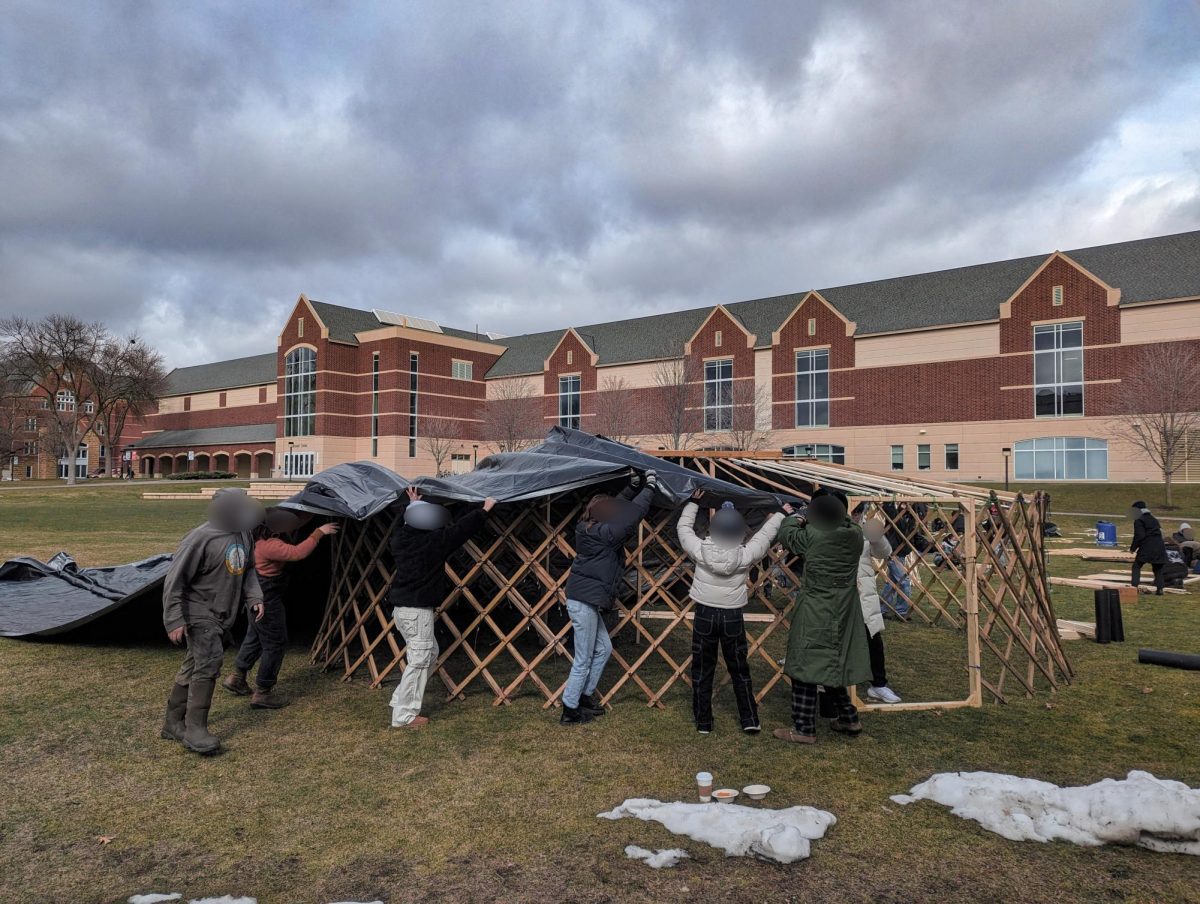A new concentration may soon be coming to Macalester. Although agriculture has long been the purview of public universities, Macalester is in the process of developing an interdisciplinary concentration entitled Food, Agriculture and Society (FAS).
Concentrations at Macalester are supposed to more closely resemble real-world topics than the academic departments do. According to the Macalester website, “Colleges are organized through departments—but that’s not how the rest of the world works. Issue-focused academic programs apply an interdisciplinary approach to multifaceted global challenges.”
“The idea of a concentration is that it’s an alternative path through the curriculum. You’re not necessarily creating something new, you’re just creating another pathway” proposed concentration director and geography professor Bill Moseley said.
Among the concentrations, there are two somewhat distinct groups — area-based programs, including African studies and Middle Eastern studies and Islamic Culture — and issue-based programs, like the international development concentration, added in 2011. Food, Agriculture and Society would fall into the latter.
This possible new concentration has been a long time coming. In 2012, the International Roundtable focused on food and agriculture issues. As part of the roundtable students drafted a call to action. The document included a statement that Macalester should develop an interdisciplinary program focused on food and agriculture.
For the next two years, until 2014, students and faculty met to draft a concentration proposal. But progress stalled in 2014, when a moratorium was placed on all new concentrations —the fear being that academic programs were proliferating too quickly. During the spring of 2016 the moratorium was lifted.
“One of my biggest frustrations is that had we [created the concentration] in 2014, we would have been a real leader” among liberal arts colleges, Moseley said.
Last spring, students and faculty started meeting again to draft a proposal. They have finished that process, and are currently waiting to hear a decision from the Educational Policy and Governance Committee (EPAG).
If EPAG approves the concentration, it will be brought to the faculty for discussion and a vote. In that scenario, “the concentration would be up and running by the fall,” Moseley wrote in an email to The Mac Weekly. If EPAG doesn’t pass the proposal, it could be taken up for discussion again in the fall.
“I see it as very much a student-driven thing, but there are certainly lots of other reasons one should have a program like this at a place like Macalester,” Moseley said.
“Professor Moseley is our org advisor and so he reached out to us to get the student perspective on what the interests were,” said Megan Davitt ’17, co-chair of MacFEAST.
The group has a mailing list of over 300 students. Davitt said that while there are students who want to be involved in food and agriculture, “it can be hard to do that kind of work as an org. It would be nice to be able to learn about it in the classroom, especially centered around a concentration.”
Structure of the concentration
As of now the steering committee for FAS is made up of Moseley, associate economics professor Amy Damon and anthropology professor Arjun Guneratne.
“We all have agriculture as part of our research and part of our teaching,” Moseley said. “That’s sort of the core group and then I think a lot of other people are interested, but it’s not the main thing they do.”
There are more faculty in other departments who would also serve on the steering committee once the concentration is passed.
Classes and paths for the concentration are intentionally broad. It would require six courses (24 credits) in no fewer than three departments.
The concentration consists of “a menu of core courses, of which you would need to take three. They all have food and or agriculture as a primary focus… It could also include your senior seminar and your capstone in your discipline if it has a food and ag focus,” Moseley added.
The concentration also requires an internship that has a food and ag focus, as well as at least two supporting courses. “Those don’t necessarily have to have food and ag as a focus, but we think it’s really useful information. Ecology is a good example,” Moseley said.
Macalester’s place in food and agricultural studies
The FAS concentration could also lend itself well to experiential learning, as is highlighted by the internship requirement. Dan Guenthner and Margaret Pennings own and operate Common Harvest Farm in Osceola, Wisconsin, and both have long worked with Macalester students.
“Macalester students have represented a disproportionately large group of interns not only on our farm, but on other alternative farms in the upper Midwest,” Guenthner said.
“We have worked for years with students from the University of Minnesota, but Macalester students were asking a different kind of questions… we were really intrigued by that,” he added. “We knew that there was something going on on campus in terms of the interest on the part of the students.”
To formalize the relationship between Common Harvest and Macalester, Guenthner and Pennings drafted a proposal to make the farm a satellite site, similar to Ordway, that students could use for research and further learning.
They already knew a few professors on campus, so they had help distributing the proposal to faculty members.
“The first person to respond was Amy Damon,” Guenthner said. “She teaches a course called the Economics of Global Food Problems… she said ‘I’m coming out to visit.’”
“It was such an interesting initial conversation. If we had to guess which department would be the first to respond, economics would not have been it,” Guenthner said. Since then, four years ago, Common Harvest has been hosting classes from various departments and programs at Macalester in their on-farm classroom.
“Historically, if you look at liberal arts colleges, these were elite institutions that didn’t want to get their hands dirty,” Moseley said. “Historically, food and agriculture was a little too blue collar.” Now though, he said, “student interests are shifting.”
Liberal arts colleges are particularly well-suited to teach a broader understanding of food and agriculture, especially colleges in urban settings like Macalester.
“A narrowly trained agronomist… is less likely to imagine a world where food production occurs differently,” Moseley said.
He added, “I would like to think that we have an incredible opportunity in the Twin Cities.”
Agriculture in Minneapolis and Saint Paul is both common and diverse. There is thriving organic agriculture, urban agriculture, and Community Supported Agriculture (CSA) membership as well as Hmong agriculture. Farmers’ markets are ubiquitous within the cities, and on the other end of the spectrum, many of the world’s most powerful agriculture companies are headquartered here.
Food and agriculture is an increasingly popular career track for Macalester graduates. “Just for numbers, I reached out to 15 [alumni involved in food and agriculture who] graduated just in the last five years,” Davitt said. “We had six alumni come to campus this month to talk about their work.”
On MacDirect, a service of the CDC, there are 143 alumni listed under the agriculture category. There are 332 listed under food products.
Critiques on campus
As with all changes, not everyone on campus is in favor of the idea of a new concentration.
“I think there is some concern amongst some faculty that the college is really good at adding things but not cutting things,” Moseley added.
He stressed, however, that concentrations aren’t necessarily meant to be permanent. “I’m a little frustrated with the idea that we can’t [try] anything new, we need to do it totally right or not at all.”
The other critique is that Macalester does not currently have the means to fully teach a concentration on agriculture — both in terms of faculty and courses.
Moseley pushes back against this notion. “I think this would be an issue if we required certain types of courses, but instead you are selecting off of these menus,” he said.
Moseley expects that as departments see interest from students in food and agricultural studies, more courses and opportunities will begin to appear. He also admits that he may be more willing than other faculty members to “just give it a try.”
“If [the] fears is found to be true, [the concentration] will cease to exist after 5 years” he said.














Anna Stewart • Sep 11, 2019 at 3:26 pm
If you apply these kinds of strategies for increasing traffic on your own web site, I am obviously you will see the variation in few days.
Cameron Poole • Sep 10, 2019 at 9:43 am
whoah this blog is magnificent i love reading your posts. Keep up the good work! You know, a lot of people are searching around for this information, you can aid them greatly.
Mary Bailey • Sep 9, 2019 at 1:25 pm
Thanks for expressing your ideas with this blog. Additionally, a fantasy regarding the lenders intentions while talking about foreclosed is that the bank will not getreceive my installments. There is a fair bit of time that the bank will need payments in some places. If you are far too deep inside hole, they are going to commonly call that you pay the actual payment entirely. However, that doesn’t mean that they will have any sort of repayments at all. In the event you and the lender can be capable to work one thing out, your foreclosure process may stop. However, in case you continue to neglect payments wih the new approach, the foreclosures process can pick up where it left off.